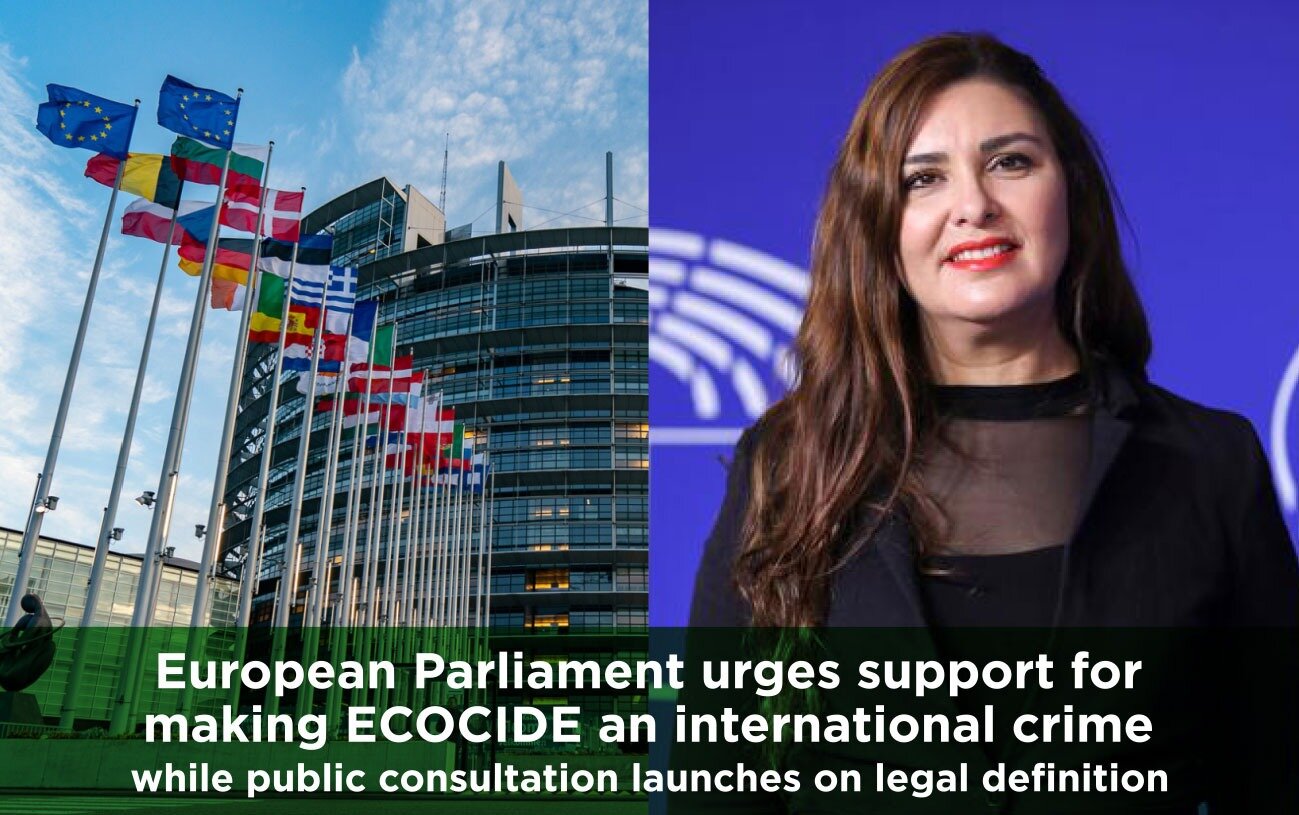European parliament urges support for making ecocide an international crime
while public consultation launches on legal definition
In an amendment to its report on Human Rights and Democracy in the World 2019, the European Parliament has voted to urge “the EU and the Member States to promote the recognition of ecocide as an international crime under the Rome Statute of the International Criminal Court (ICC)”.
The amendment was submitted by MEP Salima Yenbou (Greens/EFA - pictured above ). It underlines the interdependence of human and ecosystem wellbeing, and supports international efforts to address environmental crimes*.
MEP Marie Toussaint, long-term campaigner for EU recognition of ecocide, said: “This is a real victory, a first major step towards the recognition of ecocide by the European Union. Member states must now speak out at the ICC and on the international stage. Climate change is accelerating, the loss of biodiversity is leading to planetary pandemics, the sea is rising: let’s move forward fast!”
The news comes just as a public consultation is launched calling for input from state parties, individuals, groups, organisations, corporations and institutions into the drafting process for a legal definition of “ecocide”, a term broadly used to refer to mass damage and destruction of ecosystems.
The legal definition is being developed by an independent panel of top international criminal and environmental lawyers convened by the Stop Ecocide Foundation at the request of parliamentarians from governing parties in Sweden. The panel’s remit is to draft a robust definition that may be put forward precisely for the purpose outlined in the amended European Parliament report: adding Ecocide to the list of Rome Statute crimes. Currently these are Genocide, Crimes Against Humanity, War Crimes and the Crime of Aggression.
Chair of the Stop Ecocide Foundation Jojo Mehta says: “This European parliamentary vote is hugely encouraging. The political world is rapidly waking up to what scientists have been telling us for decades and the indigenous world has been telling us for centuries: that humanity cannot destroy the natural world with impunity. There are consequences. We know now that tipping points are being crossed and we have a short time to act. Making ecocide a crime recognises this, providing a practical guardrail to prevent the worst excesses of damage that are pushing Earth’s life-support systems towards breaking point.”
The drawing up of a legal definition, in consultation with experts and with state parties, is key to the success of this legal route, explains Mehta.
“Our Foundation is is soliciting input from respected voices in several arenas to provide a comprehensive backdrop to the drafting process. Along with primary scientific reports, we are inviting input from indigenous leaders, whose voices are indispensable here as 80% of Earth’s biodiversity is stewarded by indigenous communities. Faith leaders, youth voices and the corporate sustainability sector are also being approached. The public consultation is a fundamental part of this knowledge-gathering process.”
Mehta adds: “State Parties to the Rome Statute are also being consulted. Public and political demand for ecocide law is growing fast, and input from governments must be sought, since it is ultimately state parties which will take forward this crucial addition to the list of international crimes.”
Editors notes:
EP amendment
*This amendment was voted on 20th January 2021 by the Plenary Session of the EP (340/323/17). The full report was then finally adopted (459/62/163).
Full amendment text:
12. Stresses that biodiversity and human rights are interlinked and interdependent, and recalls the human rights obligations of states to protect the biodiversity on which those rights depend, including by providing for the participation of citizens in biodiversity-related decisions and providing access to effective remedies in cases of biodiversity loss and degradation; expresses its support to the nascent normative efforts at international level in relation to environmental crimes; in this regard, encourages the EU and the Member States to promote the recognition of ecocide as an international crime under the Rome Statute of the International Criminal Court (ICC);
State support for criminalising ecocide
There is growing state support for the move to make ecocide an international crime: in December 2019 the small island states of Vanuatu and the Maldives called for serious consideration of ecocide crime at the International Criminal Court’s assembly; early in 2020 the Swedish workers movement urged Sweden to lead on proposing it; in June President Macron of France promised to champion it on the international stage. Pope Francis has also stated that he believes ecocide should be added to the list of international crimes (Nov 2019); he received Stop Ecocide’s Advisory Board member Valérie Cabanes for an audience in September 2020. Two motions on ecocide have been submitted to the Swedish parliament, one from the Left Party and one from the Greens/Social Democrats. In October the newly formed Belgian government pledged to “take diplomatic action to halt ecocide crime”, and in December Belgium became the first European country to raise the issue at the ICC. Also in December, Finland’s Minister of Foreign Affairs declared support for Vanuatu and the Maldives’ call for serious discussion of ecocide. In Spain, the Foreign Affairs parliamentary committee submitted a resolution to the government urging it to examine possibilities of legislating for ecocide domestically and internationally.
****ENDS****
Stop Ecocide International
Who we are
What we do
Contact:
Interview & comment requests etc via: Sara Qualter - saraq@stopecocide.earth
Website: www.stopecocide.earth



